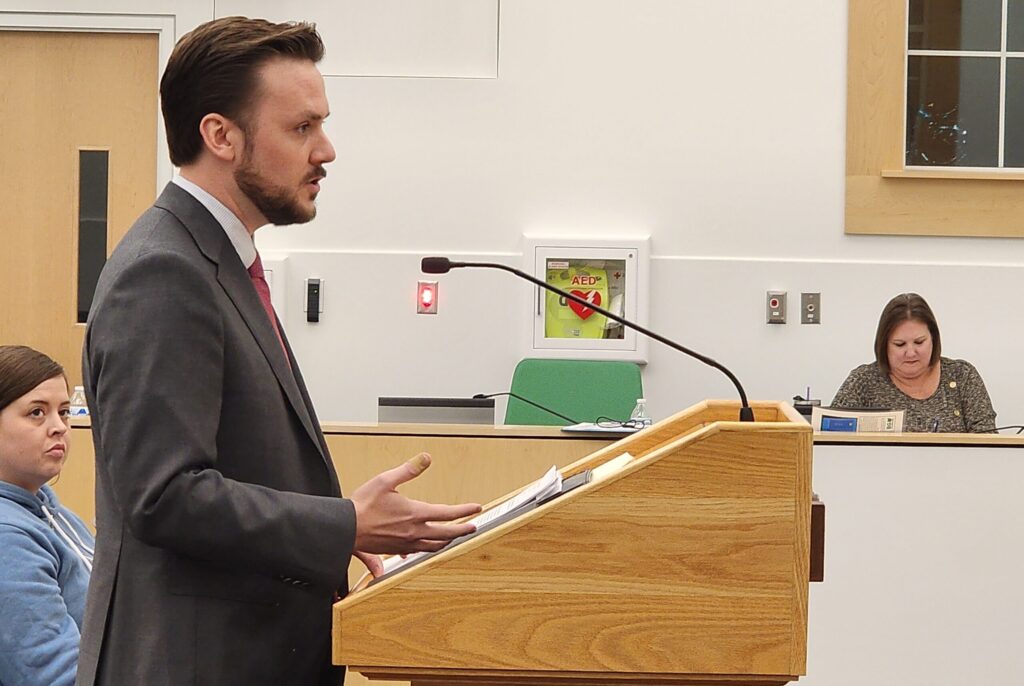By JAN LARSON McLAUGHLIN
BG Independent News
Bowling Green City Council voted last week to require contractors hired by the city to not just meet “lowest and best” bidding rules – but verify their compliance.
The vote adopting a “responsible bidder ordinance” was divided along party lines. Democratic council members Jeff Dennis, Mark Hollenbaugh, Rachel Phipps, Joel O’Dorisio and Nick Rubando voted “yes,” while Bill Herald and Greg Robinette voted “no.”
Dennis, who proposed the ordinance, said it will allow the city to exercise even greater fiscal responsibility by ensuring that major projects funded by taxpayer dollars are completed by highly skilled local workers who receive fair compensation for the work they perform.
According to Dennis, there is no evidence that “responsible bidder ordinance” policies raise construction costs – but they do improve employment conditions and living standards for local workers, he said.
“We are already paying for the standards set by this ordinance – this will help verify and ensure that the city and its taxpayers are getting what we’re paying for,” he said.

This standard has been adopted in several Ohio municipalities including Perrysburg, Cincinnati, Cuyahoga Falls, East Lake, Lorain, Mansfield, Maumee, Toledo, Whitehouse, and Uhrichsville.
City and state code already require contractors hired for projects to pay prevailing wages, offer health insurance, and provide for pensions. This ordinance adds one more step requiring them to sign on the dotted line that they are doing so. And it requires them to fess up to any violations of OSHA rules or tax laws.
But some city officials are concerned that requiring any additional hoops to jump through may discourage some contractors from bidding jobs for Bowling Green. Some of the specialized water and sewer projects already have limited bids from contractors.
Following is an overview of how the “responsible bidder ordinance” would work:
- The ordinance would establish minimum standards for companies hired to complete major construction projects. Bidders would need to certify to the city that various employment practices are being met. The city would be required to consider these factors, along with the 16 factors that are already enumerated in selecting the lowest and best bid for the project.
- The ordinance will ensure that major construction projects funded using taxpayer dollars are not awarded to low bidders who cut corners or have poor track records. It will give the city greater discretion when it comes to selecting the best bid for a given project (which might not always be the lowest). This promotes fiscal responsibility and protects Bowling Green taxpayers by helping to ensure that major construction projects are awarded to reputable contractors who prioritize local workers and have demonstrable track records of completing jobs on time and under budget.
- The ordinance would apply to all publicly funded projects that are subject to Ohio’s prevailing wage laws, including new construction estimated to cost more than $250,000; renovation or repairs estimated to cost more than $75,000; new construction related to roads or sewers estimated to cost more than $93,292; and repair or renovation of roads or sewers estimated to cost more than $27,950.
- Bidders must submit to the city that they make healthcare and retirement benefits available to their employees. These fringe benefits are already a requirement for projects that fall under Ohio’s prevailing wage laws. This provision requires verification of those benefits.
- Bidders must employ graduates of a construction apprenticeship program certified and regulated by the State of Ohio or the U.S. Department of Labor, or employees who have at least five years of documented experience in the field. Up to 25% of the workers may be in pre-apprenticeship programs or have less than five years in the field.
- Bidders must disclose any OSHA violations; any prior violations of state local, state, or federal wage laws; a valid Ohio Bureau of Workers’ Compensation insurance policy; and an estimate of the bidder’s workforce that resides in Northwest Ohio.
Bowling Green Public Infrastructure Director Brian O’Connell voiced some concerns about the ordinance, noting that the current system has worked well for the city.
“There’s no problem we are aware of with the current selection process,” O’Connell said.
But the additional paperwork could result in fewer bids on city projects, especially from smaller contractors, he said.
“It does not seem to be in our best interest,” he said. “I’m unclear how this will improve the quality of work done in the city.”
City Attorney Hunter Brown said he was ambivalent about the ordinance, adding that he wished Perrysburg’s recently adopted and more restrictive ordinance had been in place longer to see if it generated any problems for that city.
Mayor Mike Aspacher, a retired union plumber and graduate of a certified apprenticeship program, voiced his concern about contractors not always being able to hire workers from such a program. Dennis added amendments to the ordinance to eliminate that problem.
“This legislation would not alter any of our policies or procedures,” Aspacher said of the ordinance.





